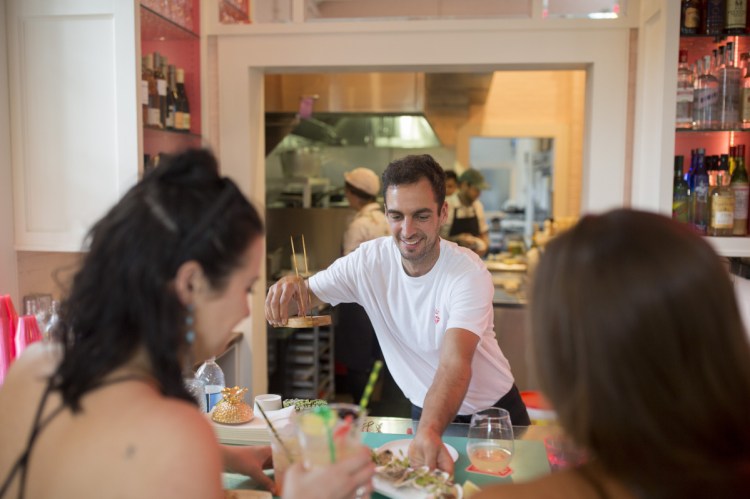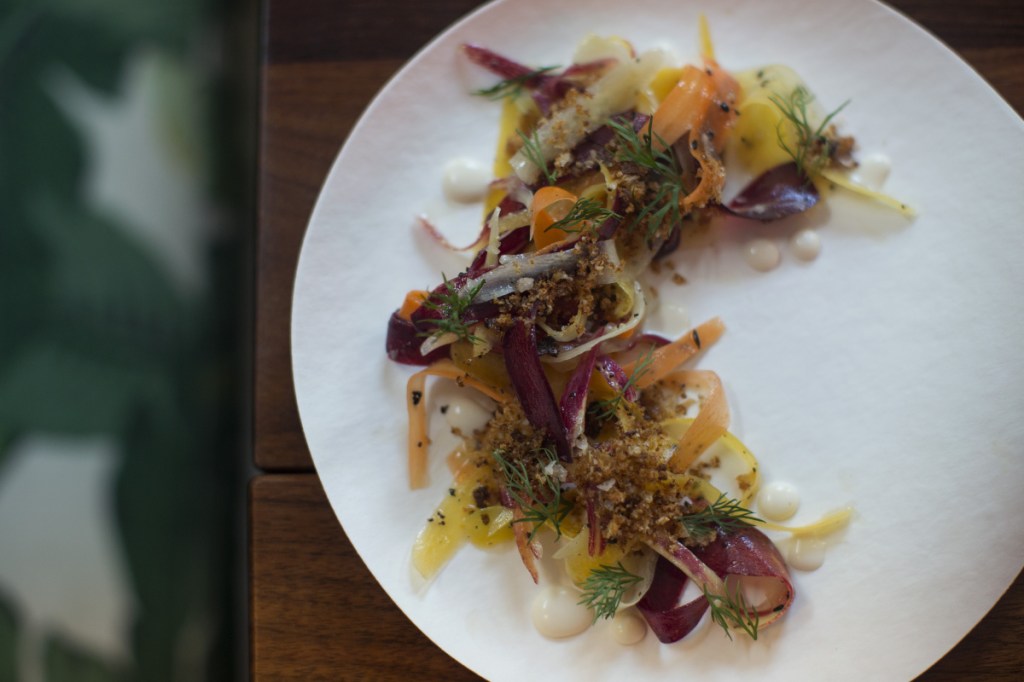Limitations are a big part of what makes Crown Jewel great.
The brick-fronted, seasonal restaurant calls attention to some, like its rather remote location on Diamond Cove, a semi-private community on the northern half of Great Diamond Island.
For the better part of a century, the island was home to Fort McKinley, a military base built during the Spanish-American War. As need for the fort disappeared, so did the soldiers and staff who maintained the buildings. In recent decades, the abandoned barracks and station houses have been restored and converted into slate-roofed houses and businesses.
Crown Jewel occupies the former blacksmith’s shop, an active weapons workshop long since converted to a general store that still operates from the rear of the building. You’d never guess that there were once anvils and molten iron here in the pastel, pink-and-coral-hued tropical fantasy of a dining room. Today, the only thing glowing is a Neon Dave sculpture of a tiara-topped flamingo; it buzzes and beckons you to take a seat – perhaps at one of the rattan stools that fringe the turquoise bar, or perhaps on one of the palm-leaf-patterned banquette cushions. There’s a clear seaside vacation theme here, though maybe not the one you’d expect from a restaurant on an island in Casco Bay.
“I was searching for an island space for four years. And when I found it, I knew I didn’t want to do anything related to nautical Maine. That’s been done,” owner Alex Wight said. “I was inspired to create a more universal atmosphere celebrating that it’s summer and we’re out on an island.”
It may not be conventional, but it works. What’s more, the picturesque 40-minute ferry rides to and from Portland bookend the meal with tugboats and salt spray. To eat at Crown Jewel is to feel transported. Even the feisty six-top of seniors next to me agreed, remarking “I just can’t get over the fact that we’re still in the city,” and “Can you believe we’re in Portland, not Fort Lauderdale?”
But being a ferry ride away from suppliers has plenty of downsides. Executive chef Rocky Hunter, formerly of White Lies in Colorado and David’s Opus Ten, explained: “The logistical challenges are easily doubled for us – just getting things in the door. We have to be extremely organized with all of our ordering and sourcing, so yeah, we’re meticulous about getting all the things so we’re ready.”
That means pantry staples like golden raisins and maple syrup needed for pastry chef Angela Cochran’s brown bread dessert ($10), a custardy, if slightly over-bruleed cousin of British sticky toffee pudding made with tin-can-steamed brown bread.
So too, the hake for Hunter’s Iberian-style whitefish with chorizo and beans ($19). Every morning, it comes over on the ferry from Harbor Fish Market and is raced to the restaurant in the back of a golf cart. The kitchen sears the fish, then adds it to fragrant, saffron broth-simmered beans and rendered discs of spicy chorizo that lazily release their fluorescent orange oil.
“It’s a take on a Portuguese fish stew, with New England ingredients, but just elevated in its plating,” Hunter told me.
When I heard him say “plating,” I chuckled a little. Not because the dish wasn’t appealing, with its scattering of microgreens and wedge of lime, but because every one of the dishes I tasted at Crown Jewel was served on paper. The absence of durable, washable materials used for service, including utensils, left me scratching my head throughout the meal.
As it turns out, water is another of Crown Jewel’s restrictions. “We had a choice to make before we opened,” Hunter explained. “The city allots certain gallon amounts for a certain number of employees. They would have signed off on a 14-seat restaurant using regular barware and dishware, or 35 seats if we made 95 percent of the dishes recyclable and compostable.”
So when the Fried Green Things ($8), a super-savory, deep-fried assortment of kale leaves, Brussels sprouts and poblano pepper strips, arrives at the table, it appears in a white sugarcane serving dish stained flaming red by the harissa that Hunter prepares from dried apricots and Calabrian chiles. It’s a little on the salty side, so as you eat, you’ll become familiar with the recyclable plastic (and branded) glasses used to serve water and fruity cocktails like a too-sweet rhubarb Collins ($11) or a well-balanced mezcal-and-macerated-berry Strawberry Smash ($12).

The brown bread dessert served with vanilla creme, maple-brown butter powder, ginger candied raisins and borage flowers at Crown Jewel
Later (or if you visit the general store during the daytime), you might spoon shaved ices, drizzled with house-made peach and horchata syrups, sweetened condensed milk, and scattered with chewy mini-mochi ($4/$5.50) with recyclable plastic spoons.
And if you’re in the mood to share, you’ll have to divvy up your Simple Burger ($16) – a straightforward, intensely summery sandwich made with mostly lean ground chuck that the kitchen executes beautifully – with a bamboo knife. Don’t skip the $2 upgrade: a slathering of onion-and-tomato jam that slaps you in the face with umami. Also: Don’t share. This is a burger that you’ll want to finish on your own.
You might want an extra bite just to confirm how good Crown Jewel’s burger is, once you learn that Hunter has never actually eaten one himself. A vegan since he enrolled in culinary school 13 years ago, Hunter is the author of his own, most significant limitation: preparing food that he can never try.
“I work with a few folks on my team for tasting,” he said. “We have worked out a scale of 1 to 10 for various things: saltiness, bitterness, sweetness. We talk a lot about the dishes.”
More than hiring staff to act as tongues-by-proxy, Hunter has found a way to taste most components of dishes that ultimately do become non-vegan. “I flipped the prep and cooking procedures from the way they usually are,” he said. “One example is: Rather than braising meat in a pan, then removing the protein and building a sauce, we flip that backwards and build a totally vegetable-based sauce, tasting it and tasting it until right at the last minute, we incorporate the animal ingredients.”

Shaved ice with peach and horchata syrups, macerated strawberries and mini mochi at Crown Jewel.
In dishes like the superb flash-blanched summer tomatoes with grilled sweetcorn pudding and blackberry gastrique ($14), Hunter’s approach takes him to the brink of service, when Parmesan is shaved over the dish. Not too much, just enough to cut through the sweetness of the corn and berries.

Blair Kemp, a server at Crown Jewel, behind the bar at Crown Jewel.
Elsewhere on the menu, fully vegan dishes hide out in plain sight, like the carrot “lox” ($12), a deconstructed-then-reimagined interpretation of a pumpernickel bagel and smoked fish that has become Hunter’s well-Instagrammed signature plate. He cures heirloom carrots in salt, sugar and dill, then shaves them (albeit probably a mandoline notch too thickly) and finishes the dish with smoked olive oil and cider vinegar steeped with everything-bagel spices.
But what is most remarkable is that he and his team are able to create a few superlative plates that pivot around meats and fish. One in particular is the oyster sliders ($16). Hunter and his team build tiny nests of lemony, shaved asparagus slaw on butter-griddled brioche buns, topping each with a single cornstarch-dredged, deep-fried oyster that dribbles hot and saline down your chin as you take your first bite. “My god,” my dinner guest exclaimed as he chewed. “Let’s have another 10 of those, please!”
In that moment, I was ready to give up on taking notes and go along with his suggestion. I forgot that the chef very likely had never tasted this particular appetizer, and I certainly wasn’t thinking about how I was picking crispy fried crumbs off rough-edged paper. All that mattered was the dish in front of me – a fully formed celebration of summer on an island.
Andrew Ross has written about food in the United Kingdom and in New York, where he co-founded NYCnosh, a food website. He and his work have been featured on Martha Stewart Living Radio and in The New York Times. Contact him at:
andrewross.maine@gmail.com
Twitter: @AndrewRossME
Send questions/comments to the editors.



